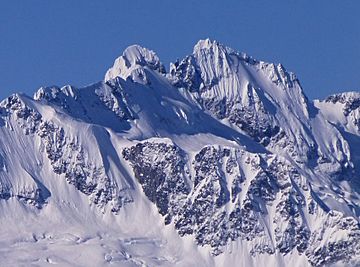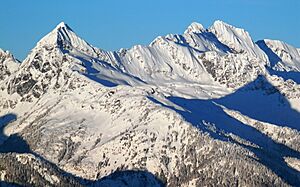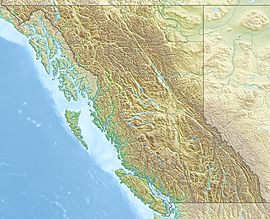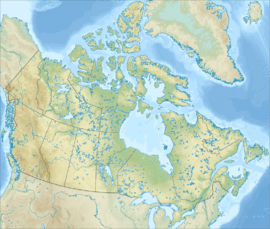Mount Dione facts for kids
Quick facts for kids Mount Dione |
|
|---|---|

Mount Dione (left) with Mt. Tantalus
|
|
| Highest point | |
| Elevation | 2,589 m (8,494 ft) |
| Prominence | 129 m (423 ft) |
| Parent peak | Mount Tantalus (2608 m) |
| Listing | Mountains of British Columbia |
| Geography | |
| Location | Tantalus Provincial Park British Columbia, Canada |
| Parent range | Tantalus Range Pacific Coast Ranges |
| Topo map | NTS 92G/14 |
| Climbing | |
| First ascent | 1916 by J. Fyles and T. Fyles |
| Easiest route | Scrambling Southeast Ridge |
Mount Dione is a tall mountain peak located in British Columbia, Canada. It stands at 2,589-metre (8,494-foot) high. You can find it in the Tantalus Range, which is part of the beautiful Tantalus Provincial Park.
This mountain is about 17 km (11 mi) northwest of a town called Squamish. It's also very close to Mount Tantalus, which is the highest peak in the Tantalus Range. Mount Dione has two glaciers: the Dione Glacier on its south side and the Rumbling Glacier to its northeast. Water from the mountain flows into the Squamish River and the Clowhom River.
The very first ascent (when someone first climbed to the top) of Mount Dione happened in 1916. Two brothers, Tom Fyles and John Fyles, were the first to reach its summit.
What's in a Name?
The mountains in the Tantalus Range are named after characters from Greek mythology. Mount Dione is named after Dione, who was the wife of Tantalus in these ancient stories.
The name for Mount Dione was suggested by Neal Carter from the British Columbia Mountaineering Club. It became official on June 6, 1957, when the Geographical Names Board of Canada approved it.
Weather at Mount Dione
Mount Dione is in a place with a "marine west coast" climate. This means it gets a lot of rain and snow. Most of the weather comes from the Pacific Ocean. When these weather systems hit the Coast Mountains, they are forced upwards. This causes them to drop their moisture as rain or, in winter, as heavy snowfall.
Because of this, the Coast Mountains get a lot of precipitation. In winter, temperatures can drop very low, sometimes feeling colder than −30 °C with the wind. The best time to climb Mount Dione is usually from July through September, when the weather is more favorable.

Climbing Mount Dione
Mount Dione is a popular spot for rock climbing. Here are some of the known climbing routes:
- Southeast Ridge - This route was first climbed in 1916.
- West Face - This route was first climbed in 1996.
- West Buttress - This route was first climbed in 2002.



